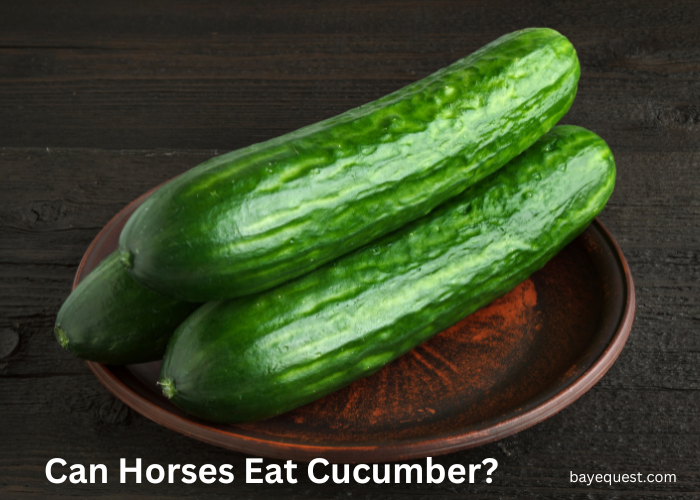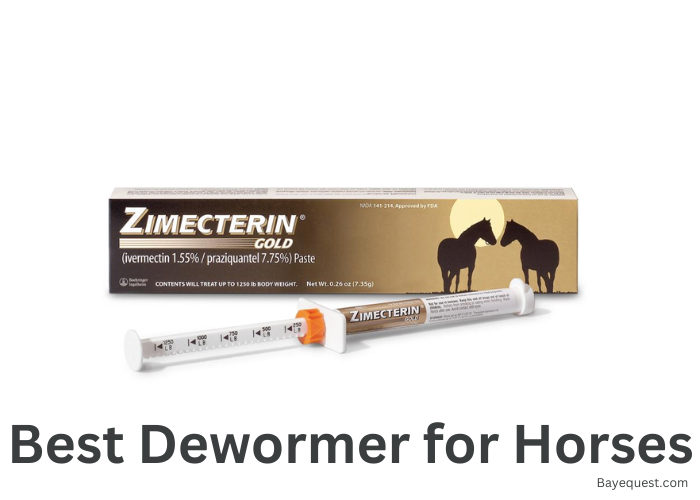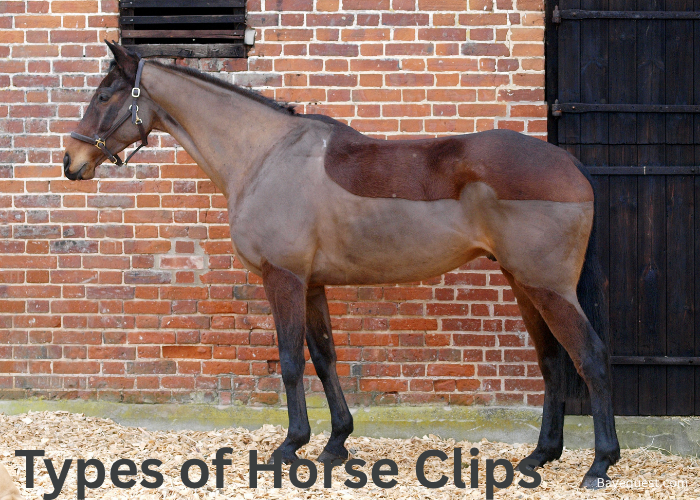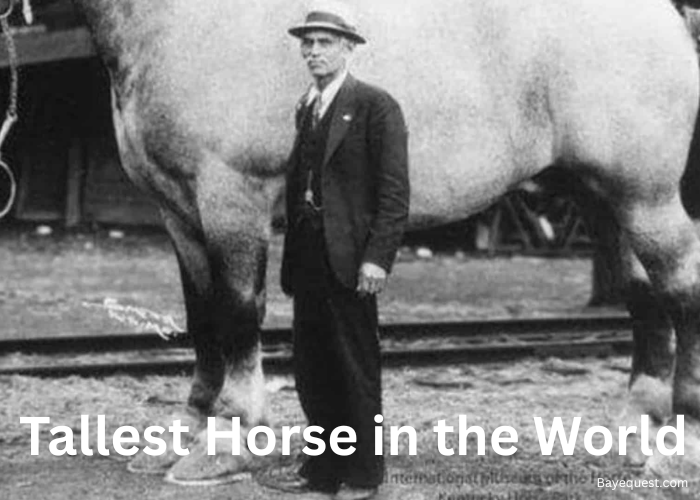Cucumbers are a common snack in many kitchens, but can they be shared with your horse? The answer might surprise you.
Horses have a unique diet, and not everything we eat is safe for them. In this post, we’ll explore whether cucumbers are a healthy treat or a risky bite.
We’ll break down the benefits and any potential concerns, so you know exactly what’s best for your horse. Stick around to find out if cucumbers can make it onto your horse’s snack list!
Can Horses Eat Cucumber? Key Takeaway
Yes, horses can eat cucumbers. Cucumbers are a safe, low-calorie snack rich in vitamins A, C, and K, along with essential minerals like potassium. The high water content helps hydration, while cucumber skin offers natural fiber for digestion. Just ensure cucumbers are washed and sliced for easy chewing and digestion.
Do Horses Eat Cucumbers?
Yes, horses eat cucumbers. Cucumbers are a safe and hydrating snack, offering a good water source and vitamins.
However, as with any treat, cucumbers should be given in moderation. Introduce them slowly into a horse’s diet to ensure they do not cause any digestive upset.
Ensure the cucumbers are clean and free of pesticides or chemicals before feeding them to your horse. Generally, they should be cut into smaller chunks to prevent choking hazards.
Related read: Do Horses Eat Broccoli?
How Many Cucumbers Can I Feed My Horse?
When it comes to feeding cucumbers to your horse, moderation is key. A few slices are just enough. You can give them a couple of slices a few times weekly as a treat.
Always monitor your horse’s reaction to new foods. If all goes well and there are no signs of digestive upset, you can gradually offer more.
Treats like cucumbers should only make up a small part of your horse’s diet, mostly hay and grass. So, a few cucumber slices are plenty for a little treat.
They’re like the icing on the cake—not needed, but a nice little extra.
Benefits of Cucumbers to Horses
Cucumbers offer several benefits to horses when included as a part of their balanced diet. Here are some key advantages:
Hydration. Cucumbers are about 95% water, making them an excellent source of hydration. This is particularly beneficial during hot weather or after exercise, helping to replenish fluids and keep the horse cool.
Low in calories. They are low in calories, which makes them a suitable snack for horses that need to manage their weight, such as those prone to obesity or laminitis.
Vitamins and minerals. Cucumbers contain Vitamin K, which is important for bone health. They also provide a small amount of potassium and magnesium.
Digestive health. Cucumbers’ high water content and fiber can help promote healthy digestion and prevent constipation in horses.
Skin and coat health. Cucumbers contain silica, which can contribute to the health of a horse’s skin and coat. This mineral helps enhance the skin’s elasticity and adds shine to the horse’s coat.
Non-starchy treat. Cucumbers are a great treat option for horses that are sensitive to sugars and starch, as they are very low in sugar and starch.
Nutritional Value of Cucumber
| Nutrient | Amount |
| Calories | 15 kcal |
| Water | 95% |
| Protein | 0.65 grams |
| Total Fat | 0.11 grams |
| Carbohydrates | 3.63 grams |
| Dietary Fiber | 0.5 grams |
| Sugars | 1.67 grams |
| Vitamin C | 2.8 mg |
| Vitamin K | 16.4 µg |
| Vitamin A | 105 IU |
| Potassium | 147 mg |
| Magnesium | 13 mg |
| Calcium | 16 mg |
| Iron | 0.28 mg |
How to Safely Feed Cucumbers to Horses
Feeding cucumbers to your horse is pretty straightforward, but you’ll want to keep a few things in mind to make sure it’s done safely:
Wash them well. First, give the cucumbers a good rinse. This will remove any pesticides or dirt on the skin.
Cut them up. Next, chop the cucumbers into smaller pieces. This helps prevent choking hazards and makes them easier for your horse to munch on.
Start slow. If your horse has never tried cucumbers, start with just a few pieces. This way, you can ensure they digest them well without any issues.
Watch the amount. Even though cucumbers are healthy, they shouldn’t replace the main parts of your horse’s diet. Think of them as a treat, not a meal. A few pieces here, and there are plenty.
Remove the ends. Slice off the ends of the cucumber. They can be a bit hard and bitter, which might not be so tasty for your horse.
Considerations for Feeding Cucumbers to Horses
When you’re thinking about adding cucumbers to your horse’s diet, there are a few things you’ll want to keep in mind:
Start slow. Just like any new treat, begin with a small amount. This helps you see how your horse handles it and ensures it doesn’t upset their stomach.
Wash thoroughly. Always wash cucumbers well to remove any chemicals or dirt on the skin.
Cut properly. Chop the cucumbers into small, bite-sized pieces to prevent any choking hazards.
Moderation is key. Cucumbers are great but should only be a small part of your horse’s food. Most of their diet should still be hay and grass.
Observe your horse. Watch for any signs of discomfort or allergic reactions after your horse eats cucumbers for the first time. If you notice anything off, skipping cucumbers in the future might be best.
No replacements. Don’t let cucumbers replace the nutrients your horse gets from their main meals. Think of them more as a hydrating snack or a little bonus.
Potential Risks and Side Effects
While cucumbers are safe and healthy for horses, there are a few potential risks and side effects to consider before including them in your horse’s diet:
1. Choking hazard. If not properly prepared, cucumbers can pose a choking risk. Cut them into small, manageable pieces your horse can easily chew and swallow.
2. Digestive upset. Introducing new food into a horse’s diet too quickly can lead to digestive upset. Symptoms may include mild colic or diarrhea. To avoid this, introduce cucumbers slowly and in small amounts, watching for any signs of digestive discomfort.
3. Pesticide exposure. Cucumbers bought from stores may be treated with pesticides, which can be harmful if ingested in large amounts. Washing cucumbers thoroughly or choosing organic options can help minimize this risk.
4. Nutrient imbalance. Overfeeding cucumbers can lead to an imbalance in the horse’s diet since cucumbers are low in calories. They should only be fed as a treat, not as a significant part of the diet.
5. Allergic reactions. Although rare, some horses might be allergic to cucumbers. If you notice any allergic reactions, discontinue feeding them and consult a veterinarian.
Tips for Feeding Cucumbers to Horses
Feeding cucumbers to your horse can be a refreshing treat, especially on a warm day. Here are some straightforward tips to do it safely:
Wash them first. Always give the cucumbers a good rinse to wash off dirt or chemicals.
Cut them up. Chop the cucumbers into small pieces to make them easy for your horse to chew and reduce the risk of choking.
Go slow. Introduce cucumbers slowly into your horse’s diet. Start with just a few pieces and see how they react.
Keep it small. Remember, cucumbers are a treat, not a meal. Keep the portions small — a handful of pieces is plenty.
Watch and learn. Keep an eye on your horse the first few times they eat cucumbers. Look out for any signs of digestive upset or allergies.
Mix it up. If your horse likes cucumbers, you can mix them with other safe fruits or veggies for a little variety.
Horse’s Digestive System
The horse’s digestive system is unique and complex, reflecting their evolution as grazing animals. Understanding it helps in managing their diet and health effectively. Here’s a straightforward explanation:
Mouth and teeth
Horses have large, flat teeth designed for grinding grass and other fibrous material. Their saliva contains enzymes that start breaking down carbohydrates. Continuous chewing helps produce saliva, which buffers stomach acids and aids digestion.
Esophagus
Once the food is chewed, it travels down the esophagus into the stomach. The esophagus only allows food to move in one direction due to a one-way valve at the stomach entrance, preventing horses from vomiting.
Stomach
The horse’s stomach is small, only about 8-15 liters. It functions best when it’s not too full, which is why horses graze little and often.
The stomach secretes acids and enzymes that begin the protein digestion process. However, the stomach’s small size and the continuous acid secretion necessitate frequent, small meals.
Small intestine
Digestion continues in the small intestine, where most nutrients are absorbed. Enzymes from the pancreas and bile from the liver aid in breaking down food so nutrients can be absorbed into the bloodstream.
Cecum and large colon
The cecum functions like a fermentation vat. It is where the digestion of fibrous plant material occurs. This microbial digestion produces volatile fatty acids, which the horse uses as a significant energy source.
The large colon further absorbs water and nutrients while forming solid waste material.
Small colon and rectum
The small colon is where the final stages of water absorption occur, and waste is formed into solid balls of manure. The rectum then holds the waste until it’s expelled.
Horses That Should Not Eat Cucumbers
While cucumbers are safe and healthy for most horses, there are specific circumstances where cucumbers might not be suitable for certain horses. Here are some examples:
- Horses with metabolic issues
- Horses with allergies
- Horses with digestive problems
- Horses with dental issues
What Other Vegetables Can Horses Safely Eat?
Horses can enjoy a variety of vegetables as part of their diet, providing additional nutrients and variety. However, to avoid digestive issues, introduce new food slowly and in moderation.
Here’s a list of vegetables that are generally safe for horses to eat:
- Lettuce (Read more: How much lettuce should a horse eat?)
- Carrots
- Celery
- Pumpkin
- Parsnips
- Beetroot
- Squash
- Green beans
- Turnips
- Sweet potatoes
FAQs
Can horses have oranges?
Yes, horses can eat oranges in moderation. Oranges provide vitamin C and other beneficial nutrients. However, remove the peel to avoid digestive issues. The fruit should also be introduced slowly into the horse’s diet to ensure it does not cause any adverse reactions.
Can horses have bananas?
Yes, horses can have bananas, including the peel, which is safe and nutritious for them. Bananas are not just a tasty treat. They’re a good source of potassium, vitamins, and fiber, making them a beneficial addition to your horse’s diet. However, like all treats, they should be given in moderation.
Read also: Are bananas safe for horses?
Can horses eat meat?
No, horses should not eat meat. They are herbivores whose digestive systems are designed to process plant materials, not animal proteins. Feeding meat to horses can lead to serious digestive and health problems.
Can horses have strawberries?
Yes, horses can eat strawberries. They are a healthy, low-calorie treat rich in antioxidants, vitamins, and minerals. As with other treats, strawberries should be given to horses in moderation. Find out more information on feeding strawberries to horses in our insightful blog, “Can horses have strawberries?”
Can Horses Eat Cucumbers? Conclusion
So, can horses eat cucumbers? Absolutely. These crunchy, hydrating treats are a great addition to your horse’s snack rotation, especially on those warm sunny days.
Remember to wash them well, cut them up to avoid choking hazards, and introduce them slowly into your horse’s diet. Like any treat, moderation is key—cucumbers are not a meal replacement but a delightful extra.
Whether you’re tossing a few slices into their feed bucket or hand-feeding them as a bonding treat, cucumbers can bring lots of fun to your horse’s diet. So go ahead, let your equine friend crunch on some cucumber goodness.








